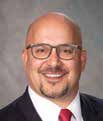By Donna Motley, Vice President of Claims
Injuries seem to run in cycles. During the course of the year, we will see a rash of a particular type of injury. At certain times, it will seem like we receive an above average amount of hernia claims, or shoulder injuries, or foot injuries, etc. This past November and December, we received an inordinate number of head and/or face/mouth injuries.
 ANY injury to the head is serious. ANY injury to the head should be called in to us immediately. ANY injury to the head should be treated immediately. A visit to the occupational clinic is fine; if the clinic feels it is warranted, they will refer the injured worker to the emergency room where, most likely, a CT Scan may be performed. You want to avoid the employee indicating they are “fine”, then going home and deciding later that evening that they need medical treatment and they then go to the emergency room without authorization.
ANY injury to the head is serious. ANY injury to the head should be called in to us immediately. ANY injury to the head should be treated immediately. A visit to the occupational clinic is fine; if the clinic feels it is warranted, they will refer the injured worker to the emergency room where, most likely, a CT Scan may be performed. You want to avoid the employee indicating they are “fine”, then going home and deciding later that evening that they need medical treatment and they then go to the emergency room without authorization.
Investigation of injuries to the head is imperative. Of particular importance, immediately following the incident/injury, is whether or not the employee was coherent, did they lose consciousness? What did the injured worker do or say immediately following the incident? Were there any physical signs of injury – i.e. bleeding, a lump, redness or bruising? Call EMS if you feel it is warranted. Early treatment of a head injury helps avoid accelerated symptoms. In this age of the Internet, it is not uncommon for an injured worker (regardless of the type of injury) to immediately go home and read up on symptoms and decide their injury is a text-book case. Should the employee have a history of a “prior” head injury, the severity of the case has just doubled.
 Early notification to our office enables us to immediately assign a Nurse Case Manager and schedule the injured worker with the appropriate doctor specializing in this type of injury. True head injury symptoms can linger and appropriate medical care is critical.
Early notification to our office enables us to immediately assign a Nurse Case Manager and schedule the injured worker with the appropriate doctor specializing in this type of injury. True head injury symptoms can linger and appropriate medical care is critical.
When an employee sustains an injury to their mouth and teeth, treatment is a little different. Again a visit to the occupation clinic is fine; we have had a few cases where the clinic did refer the injured worker to a dentist. A lot of dental facilities will not accept Workers’ Compensation claims. We are not opposed to an employee seeking treatment with their personal dentist, HOWEVER, the dentist must know up front that treatment and payment will be covered as a Workers’ Compensation claim. And that, they must accept what the MI Workers’ Compensation fee schedule allows as payment. THEY CANNOT BILL THE EMPLOYEE/PATIENT FOR ANY BALANCE TO WHICH THEY FEEL ENTITLED.
Also important in any case involving a visit to a dentist, we require an “estimate” of the work to be performed “prior to” authorizing any treatment. We have seen multiple cases where the employee does not regularly treat with a dentist, and following an injury the dentist wants to fix everything in the employee’s mouth that needs repair. If a front tooth is damaged, we are not going to pay for a root canal on a molar! A classic example of this is a claim filed by the dentist for services in the amount of $25,625. After reviewing the proposed services (most of which were related to neglect and poor dental hygiene and not the work related incident) we only paid $2,500 on the claim.
 Again, when teeth are damaged, time is of the essence. A phone call to our office is most beneficial. In the most recent case we had, the employer called with the details of the injury and the dental facility to which the employee was referred. I called the dental facility and requested the estimate which they in turn faxed to me. I was then able to get a quote from our bill review provider as to how much would be paid for said services and I was able to authorize the treatment which was completed the following day. This all took place in a 24 hour period and the employee lost a minimal amount of time from work. Obviously if an employee wants the dentist to perform additional services, outside of the work injury, they are free to do so and make arrangements for payment of those additional services.
Again, when teeth are damaged, time is of the essence. A phone call to our office is most beneficial. In the most recent case we had, the employer called with the details of the injury and the dental facility to which the employee was referred. I called the dental facility and requested the estimate which they in turn faxed to me. I was then able to get a quote from our bill review provider as to how much would be paid for said services and I was able to authorize the treatment which was completed the following day. This all took place in a 24 hour period and the employee lost a minimal amount of time from work. Obviously if an employee wants the dentist to perform additional services, outside of the work injury, they are free to do so and make arrangements for payment of those additional services.





